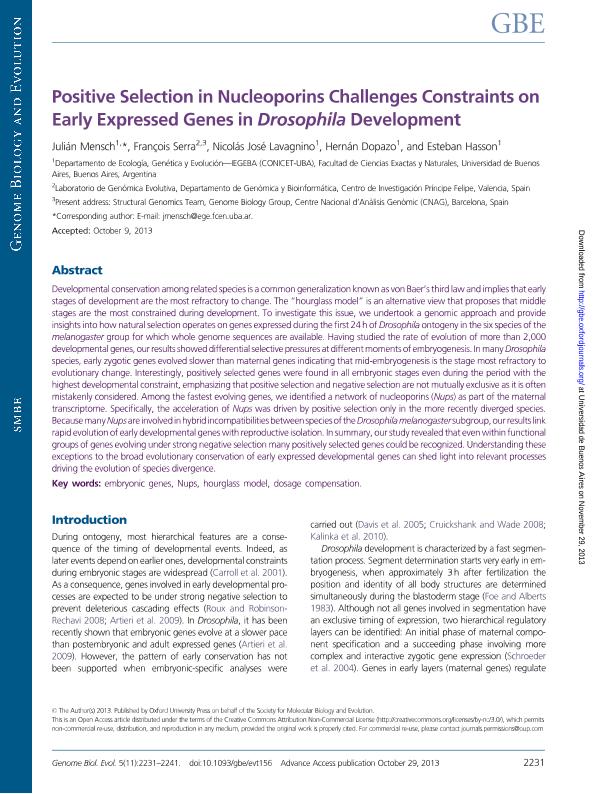Artículo
Positive selection in Nucleoporins challenges constraints on early expressed genes in Drosophila development
Mensch, Julian ; Serra, François; Lavagnino, Nicolas Jose
; Serra, François; Lavagnino, Nicolas Jose ; Dopazo, Hernán Javier
; Dopazo, Hernán Javier ; Hasson, Esteban Ruben
; Hasson, Esteban Ruben
 ; Serra, François; Lavagnino, Nicolas Jose
; Serra, François; Lavagnino, Nicolas Jose ; Dopazo, Hernán Javier
; Dopazo, Hernán Javier ; Hasson, Esteban Ruben
; Hasson, Esteban Ruben
Fecha de publicación:
10/2013
Editorial:
Oxford University Press
Revista:
Genome Biology and Evolution
e-ISSN:
1759-6653
Idioma:
Inglés
Tipo de recurso:
Artículo publicado
Clasificación temática:
Resumen
Developmental conservation among related species is a common generalization known as von Baer’s third law and implies that early stages of development are the most refractory to change. The “hourglass model” is an alternative view that proposes that middle stages are the most constrained during development. To investigate this issue, we undertook a genomic approach and provide insights into how natural selection operates on genes expressed during the first 24 h of Drosophila ontogeny in the six species of the melanogaster group for which whole genome sequences are available. Having studied the rate of evolution of more than 2,000 developmental genes,ourresults showed differential selective pressures atdifferentmoments ofembryogenesis. In manyDrosophila species, early zygotic genes evolved slower than maternal genes indicating that mid-embryogenesis is the stage most refractory to evolutionary change. Interestingly, positively selected genes were found in all embryonic stages even during the period with the highest developmental constraint, emphasizing that positive selection and negative selection are not mutually exclusive as it is often mistakenly considered. Among the fastest evolving genes, we identified a network of nucleoporins (Nups) as part of the maternal transcriptome. Specifically, the acceleration of Nups was driven by positive selection only in the more recently diverged species. BecausemanyNupsareinvolvedinhybridincompatibilitiesbetweenspeciesoftheDrosophilamelanogastersubgroup,ourresultslink rapid evolution of early developmental genes with reproductive isolation. In summary, our study revealed that even within functional groups of genes evolving under strong negative selection many positively selected genes could be recognized. Understanding these exceptions to the broad evolutionary conservation of early expressed developmental genes can shed light into relevant processes driving the evolution of species divergence.
Palabras clave:
Embryonic Genes
,
Nups
,
Hourglass Model
,
Dosage Compensation
Archivos asociados
Licencia
Identificadores
Colecciones
Articulos(OCA CIUDAD UNIVERSITARIA)
Articulos de OFICINA DE COORDINACION ADMINISTRATIVA CIUDAD UNIVERSITARIA
Articulos de OFICINA DE COORDINACION ADMINISTRATIVA CIUDAD UNIVERSITARIA
Citación
Mensch, Julian; Serra, François; Lavagnino, Nicolas Jose; Dopazo, Hernán Javier; Hasson, Esteban Ruben; Positive selection in Nucleoporins challenges constraints on early expressed genes in Drosophila development; Oxford University Press; Genome Biology and Evolution; 5; 11; 10-2013; 2231-2241
Compartir
Altmétricas



